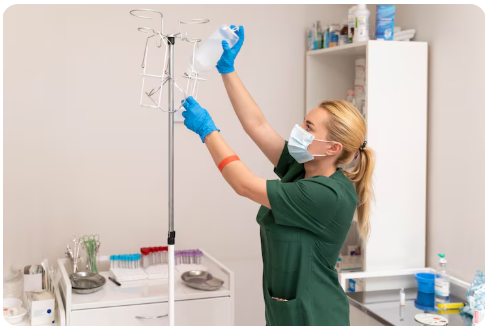Polycystic Ovary Syndrome (PCOS) is among the most frequent hormonal disorders that affects women from all over the world, and as high as 10 percent of women who are of reproductive age might suffer from PCOS. Many are not diagnosed. Along with affecting a woman’s hormone profile, PCOS can also have lasting effects if not dealt with properly. So, knowing the signs is crucial to getting prompt treatment. This blog post will examine the signs of PCOS as well as how it affects the overall health of a person, and the need for professional assistance to manage the condition effectively.
Polycystic Ovarian Syndrome (PCOS) is an illness that affects almost all parts of the body, as well as the disease of PCOS, clearly indicating an underlying imbalance that requires treatment. When you understand the spectrum of signs and symptoms, women are able to take a more active role in their overall health and well-being.
Understanding PCOS:
To understand this issue, it is essential to understand the fact that your female reproductive system controls different hormones, including progesterone and estrogen, which ensure menstrual cycles are regular and that fertility is preserved. However, for women with PCOS, the system is not functioning in harmony. PCOS is a disorder in which there is a tension in the normal condition of the hormone. It is characterized by the appearance of polycystic Ovarian structures.
This hormonal imbalance could disrupt the cycle of ovulation, which causes sac-like fluid cysts to form within the Ovaries. These tiny growths could cause menstrual cycles to become more unpredictable. However, this issue isn’t limited to the reproductive area, as it may cause anxiety-provoking physical and psychological symptoms that most people ignore.
Most Prevalent PCOS Symptoms:
Every woman with PCOS is not going to have similar symptoms; however, certain symptoms are notable as the most important indications of this disorder. A few of the more frequent one is irregular menstrual flow, that are usually the first indication of PCOS, and women who menstruate are more likely to skip their periods. Due to the menopausal transition, certain women are faced with hormonally deficient lives, which can result in a regular period; cycles can also be excessively lengthy or significantly shorter.
When there is a disturbance in the hormone balance, like in women suffering from PCOS and excessive hair growth, which is sometimes referred to as hirsutism, it is a common symptom in addition to other indications. The growth of hair can be seen in abnormal areas like the chest, face, and back. In addition, PCOS can also be identified by the loss of hair on the scalp, which is sometimes called female-pattern baldness.
Acne and excess oil production are also skin conditions caused by hormones triggered by PCOS. The symptoms aren’t more bothersome than other forms of persistent lesions that can last into adulthood.
One of the challenges that PCOS causes is unexplained weight gain or loss. Studies suggest that PCOS is connected with insulin resistance, making it incredibly difficult to manage weight.
In addition to the physical effects, PCOS can affect a person’s sleeping patterns by leading to sleep apnea or excessive sleepiness. Inability to deal with PCOS could lead to emotional swings, anxiety, and depression.
Diagnosis and Treatment:
The problem in diagnosing PCOS is that all of its signs are comparable to those that occur in other diseases. Most doctors rely on the patient’s medical history, look at their physical condition, and perform tests to identify it. Ultrasounds can show an increase in the ovaries, with numerous small cysts, and hormones may be analyzed for imbalances through blood tests.
A customized treatment plan that is tailored to the individual’s health issues and symptoms is vital once diagnosed. The majority of treatment plans from specialists incorporate lifestyle changes, like an appropriate diet, along with exercise. These modifications can control an individual’s weight and boost the sensitivity of insulin, which is crucial in relieving some of the signs and symptoms associated with PCOS.
The use of hormonal birth control is used to control excess androgen levels, as well as to manage menstrual cycles. For women who want to become pregnant, the use of fertility treatments is often advised. The procedure, such as ovarian drilling, is typically reserved for more serious cases that are caused by medication or lifestyle modifications.
With the right support from experts, PCOS is a condition that can be managed. The earlier it is recognized, the less serious the problems in the long run are.
How Does PCOS Influence Health?
Patients suffering from PCOS who fail to take action promptly are vulnerable to health issues over the long term. PCOS increases the risk of developing type 2 diabetes because of the strong relationship of insulin resistance with elevated androgens. Women with PCOS tend to have high cholesterol, hypertension and are more likely to suffer heart issues.
It’s more extensive than the physiological consequences, affecting mental health as well, by causing depression and anxiety. Infertility, when combined with other issues and social pressures, may become too much for a lot of women to manage.
To reduce the risk and ensure the highest results in health, recognizing and addressing PCOS promptly is crucial. Through treating the symptoms directly with medications and altering one’s lifestyle, women can dramatically enhance their health and improve the quality of life.
Controlling PCOS Begins by Understanding:
Recognizing the signs that are indicative of PCOS can be the initial step to an effective PCOS treatment. Understanding these symptoms can help women to control their own health, and get out professional help if they require it. In terms of the treatment method, PCOS is an all-encompassing disease that requires a variety of changes to the way of life, medications and therapy.
If any of the listed symptoms are similar to yours or are pertinent to your PCOS situation, talking to an expert is necessary. If you are committed, any symptom can be addressed to improve your life and reduce the health risks. Women suffering from PCOS are able to live their lives with ease when the appropriate treatments and measures are put in place for the health condition.
FAQs:
1. Do you have the possibility of becoming pregnant while having PCOS?
Yes, women who have PCOS are able to get pregnant. If you’re overweight or exercise regularly, PCOS makes conceiving difficult due to irregular ovulation; however, when treated, it can be improved. Consultation with your doctor is vital to figure out which options are best for you.
2. Is PCOS a lifelong condition?
Although it is believed that it will persist for the majority of women’s reproductive lifespan, PCOS can be managed and effectively treated with proper treatment. Certain women feel relief from symptoms after menopausal changes; however, as before, more hazardous conditions like diabetes mellitus remain.
3. What is the most effective method to combat PCOS through diet?
To combat PCOS, it could be beneficial to eat an insulin-free, low glycemic index (GI) eating plan that focuses on whole grains, lean proteins, and healthy fats. Through the reduction of processed and sugary foods and the increase in insulin sensitivity, insulin sensitivity is enhanced and weight loss will be more easily achieved.
4. What are the ways that PCOS affects one’s mental well-being?
Being diagnosed with PCOS can cause mental health issues like depression, anxiety, and low self-esteem. These issues may be caused by a variety of reasons that range from self-esteem issues to hormonal changes and stress. In terms of treatment, it’s crucial to think about one’s body and mind at the same time, to ensure a complete treatment.
5. What are the alternatives to non-pharmacological treatment to manage PCOS?
Non-pharmacological solutions for PCOS management are lifestyle changes like eating a balanced diet, exercising regularly, and managing stress. Acupuncture, herbs, herbal supplements, and other therapies could assist, but it is important to consult your physician before attempting these treatments.







